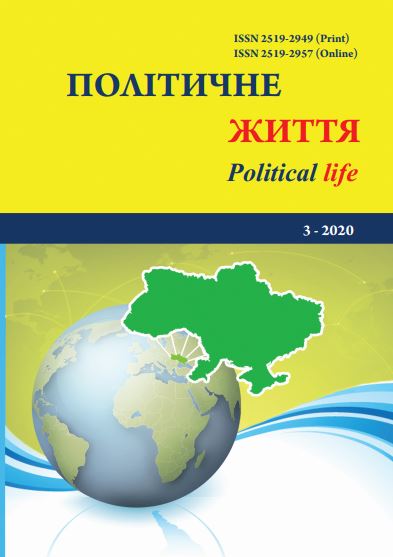Unconventional forms of protest in Ukraine: mechanism of institutional change or manipulative technology?
DOI:
https://doi.org/10.31558/2519-2949.2020.3.2Keywords:
політична участь; політична система; демократизація; інституційні зміни; політичний протест; громадянська непокора; не конвенційний протест, political participation; political system; democratization; institutional change; political protest; civil disobedience; non-conventional protestAbstract
The article deals with the peculiarities of non-conventional protest in democratization of the Ukrainian political system. The controversial role of political participation has been described as a mechanism of influencing the state authorities, driving force of reforms and, at the same time, a technology of manipulating masses, and a consequence of the struggle for power among the influential political actors. The ability of non-conventional protest to promote the transformation of a hybrid institutional system has also been analyzed.
The tendency of political elites to use mobilization of mass protests in achieving their narrow corporate goals as well as dependence of the success of protests on the will of the political elite representatives have been proved. The institutional approval of the protest practice in the struggle for power has been substantiated. It has been pointed out that there is a tendency for increasing unorganized demonstrations and strengthening the non-conventional component of protests in Ukraine due to distrust in political institutions.
The reasons and consequences of the large-scale non-conventional protests in the history of Ukraine have been considered in the context of their impact on the democratization of the political system. The nature of institutional changes arising from people’s protests has been described as superficial and indeterminate, for the most part contributing to a change of government, and a temporary relief in social tensions. Instead, the institutional system has undergone little change, asserting non-conventional protest as the only possible option of effective political participation.
The main reasons for the periodic recurrence of non-conventional mass protests are their institutionally-caused nature and their perception as an effective and standardized technique of influencing the government.
References
Барбер, Б. Сильна демократія: політика учасницького типу. Демократія. Антологія. Київ: Смолоскип, 2005. С. 254-262.
Ґутман Е. Устрій дорадчої демократії. Демократія. Антологія. Київ: Смолоскип, 2005. С. 327–363.
Putnam R. Bоwling Alone: America’s Declining Social Capital. Journal of Democracy. 1995. Jan. P. 65-78.
Васильчук Є. О. Роль незаконних воєнізованих і збройних формувань в акціях громадянської непокори та військово-політичних конфліктах в Україні. Гілея. 2017. Вип. 123. С. 308-314.
Грищенко Н.І. Протестні практики громадян України: характер основних форм прояву. Регіональні студії. Ужгород: Ужгородський національний університет, 2018. Вип.15. С. 12-15.
Зеленько Г. Політичні протести зими 2013–2014 років в Україні: зміст, форми, наслідки. Наукові записки. – 2014. – № 2(70). – С.34-55.
Колодій А. Соціальний капітал і політична участь громадянина в епоху змін. Відповідальність християнина у сучасному суспільстві. Матеріали 7-го Екуменічного соціального тижня. (29 вересня – 4 жовтня 2014 р. м. Львів). 2014. С. 34-38.
Романюк А. Порівняльний аналіз основних форм політичної участі громадян країн Західної Європи. Віче. 2008. №1. С. 44–47.
Революція на граніті 1990 року: яким був перший український Майдан / 24 канал. 2 жовтня 2019 URL: https://24tv.ua/revolyutsiya_na_graniti_1990_prichini_naslidki_uchasniki_foto_n1213193 (дата звернення 15 травня 2020).
Постанова Верховної Ради УРСР Про розгляд вимог студентів, які проводять голодування в м. Києві з 2 жовтня 1990 року від 17.10.1990. URL: https://zakon.rada.gov.ua/laws/show/402-12 (дата звернення 15 травня 2020).
За Україну без ... фанатизму. Українська правда. 25 лютого 2001 р. URL: https://www.pravda.com.ua/news/2001/02/25/2981975/ (дата звернення 15 травня 2020).
Freedom in the World 2010. Global Erosion of Freedom / Freedom House. URL: https://freedomhouse.org/report/freedom-world/2010/global-erosion-freedom (дата звернення 15 травня 2020).
World Press Freedom Index 2010 / Reporters without border. URL: https://rsf.org/en/world-press-freedom-index-2010 (дата звернення 15 травня 2020).
The Democracy Index 2011: Democracy under stress. URL: https://www.eiu.com/public/topical_report.aspx? campaignid=DemocracyIndex2011 (дата звернення 15 травня 2020).
Шаповалов С. Скільки громадян прийде на виборчі дільниці влітку? / "Демініціативи". URL: https://www.pravda.com.ua/articles/2019/07/17/7221112/ (дата звернення 15 травня 2020).
Хилько М.І. Сепаратизм: походження, сутність, різновиди. Гілея. 2019. №144. С. 128-133.
Громадянське суспільство України: сучасні практики та виклики розвитку : аналіт. доповідь; за заг. ред. О. А. Корнієвського, Ю. А. Тищенко, В. М. Яблонського. К. : НІСД, 2018. 128 с

